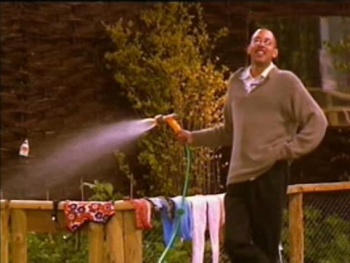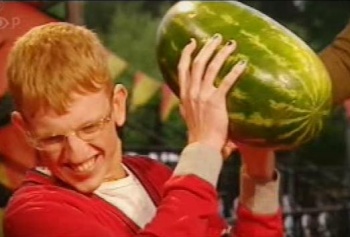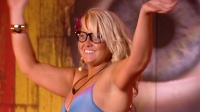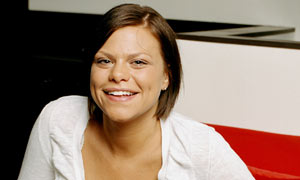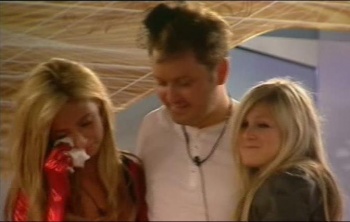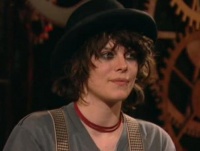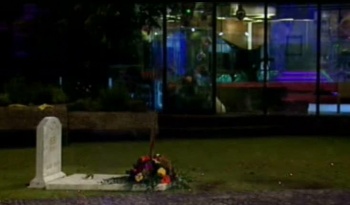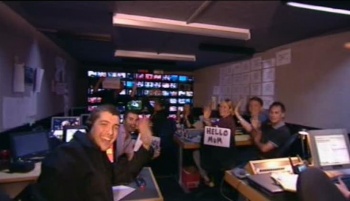Weaver's Week 2010-09-12
Last week | Weaver's Week Index | Next week
A Big Brother scrapbook
This column was pondering how to mark the end of Big Brother on Channel 4. We put the programme in its historical context last year, as part of the review of the decade. So, rather than repeat ourselves, we've broken format and written a series of short musings on and inspired by Big Brother. Those readers expecting something more robust will find the regular quiz reviews appearing next Wednesday.
Big Brother's official history remembers the verruca, and perhaps the van, but not the time the diary room chair had to be smuggled in under the nose of the launch night crowd. It remembers various activities in the hot tub, but not when it was hidden under a pile of rocks. We're reminded of the wedding, but not the time the finalists were playing hide and seek, and were so successful at hiding that Jade the seeker had to go to the diary room and ask Big Brother where her housemates were. Davina doesn't recall Federico's exit, complete with a serving of bread-and-butter pudding for her. And no-one ever speaks of the day when Davina left her mobile phone in the diary room, a housemate found it, and had the honesty not to use it. These are the Week's memories and thoughts.
"If you tell untruths to yourself about your past, you'll tell even greater ones about your future" – Kevin Myers, Irish Independent.
When a television programme is confident, it tells bold stories about the world it inhabits. The stories can be charming, they can be nasty, they all make sense of the world. As its popularity wanes, those stories become disjointed, until all that remains are fragments of a dream. And so it was with Big Brother. Series 1 was popular, gripping the public's imagination in a way that no-one could have predicted. BB2 was more popular, and BB3 launched star after star onto the public stage.
But when the fourth run proved a little less popular, had a little less conflict, the producers made some strange decisions. Start mass auditions in exhibition centres, don't get people to send in videotapes. Design the house to slope, to confuse and disorient. Choose large characters, and get them to shout at each other. And, if all that fails, re-write history – both in the short term, and on the longer view. Big Brother 4 was not the boring one, BB5 didn't need to have three people hogging spaces in the Ultimate series.
By recalling BB5 as the best series ever, the producers fell into a trap of their own making, saying that they had to make every series harder, nastier, more character-filled than the last. We didn't like the first time they went down this negative route, and reckoned that Big Brother was failing its first duty: to be entertaining television. Make it worth watching, and we'll be back.
"One door closes, another window opens." – Nick Bateman, 2000.
At heart, Big Brother is a tremendously dark and negative show. It's about rejection, about forming and fermenting divisions within a community. It's about finding the other, exposing the people who are not part of your in-crowd so that what's left is more like you. But then it goes further, the process repeats. More cracks are forced into the group, more people leave, it becomes more and more like a single person. If we're lucky, the final will intervene and bring about the simple popularity contest. If we're not, the community passes the point of homogeneity and starts eating itself like a ravenous wolf, and that makes for messy television.
If the show took its negativity a little too far sometimes, some of the other places on the interweb seem to be filled with people who dislike everything. Contributors to these "speak your branes" sites dislike the tasks, can't stand any of the contestants, object to the presenters (and no-one slags off Dermot or Davina without damned good reason), don't like Endemol as a company, they see deliberate partiality in the editing, don't like Channel 4 for putting the programme out at the same time every night, and would probably curse the ground for existing beneath their feet. These people even get upset with the other viewers, for daring to have opinions of their own. Is there anything these "speak your branes" places like? Ah, the sound of their own voices, the echo chamber of the self-righteous.
"I am a robot."
Contestants go into the house believing certain things about themselves. Some of these beliefs are accurate, some are assumptions they've made that no-one has ever bothered to challenge, and some are convenient lies that no-one questions. Some contestants, particularly those who leave early, are able to hide behind their masks for their entire time in the house. For most contestants, usually about four or five weeks in, there comes a point where that facade cracks. It can crumble slowly, as Alex Sibley began to evolve his personality gradually, grudgingly, inch-by-inch. It can snap in a moment, as Nick Bateman found out.
The most rewarding viewing was the chrysalis: someone who came into the studio thinking one thing about themselves, who was challenged – directly or indirectly – about their preconceptions, who visibly changed during their time, and emerged weeks later as someone completely different. Jade Goody is the archetypal example, Brian Dowling and Cameron Stout won by doing this.
The least rewarding were people who wanted media careers, or six months on the party circuit. These wannabes were despised by the press, who hated the way they'd risen without trace; and their jealous poison turned the viewing public against the participants, and eventually against their show. Sometimes there was merit in the criticism – no civilian Big Brother contestant has yet released a single that was anything other than toe-curlingly bad. But often times, there was nothing more than envy around, and we don't like envy.
Big Brother asked the big questions. What is the meaning of life, the human condition, society, and all that. Questions of philosophy, of existential meaning, all being tossed about before our eyes. Tossed about, but never acknowledged, not when there's a new crush to gawp at, a new twist to accommodate, some distraction so that the viewers could fill their head with transient trivia and ignore the greater matters unless they went looking for them. Big Brother's Little Brother, particularly in the last few years, was a collection of mind-numbing waffle, filling each programme with brain-dead blethering. BBLB spent its time in the intellectual gutter, blissfully unaware of the stars it could have reached.
"I like her because of who she is" – John James Parton
It's almost impossible to watch Big Brother and not get involved. The viewer needs to put in some effort, to work out who is who, discern what they're like, and whether the viewer can form a positive or a negative or any sort of attachment to the person. It's not background television. And once the viewer's worked out who they like, and who they dislike, there are allegiances made for an awfully long time.
So for the involved viewer, Big Brother can be an emotional rollercoaster. There are quiet periods, there are stomach-churning moments, there are wild swings and times when it's difficult to know which way is up. Sometimes, just when we think that's the end of the ride, we pass through the station on a parallel track and prepare to do it all again. And at the end, adrenalin may be pumping and everyone wants to do it again. But then we do it again, and as well as the euphoria there's a headache, a feeling of listlessness, a sensation that enough is enough.
From time to time, viewers say that they won't watch if contestant Joe goes. Everyone on the telly, from Davina down to BBLB's Useless Bloke says this is just emotional blackmail, and in a way it is. But what if it's also genuine? What if the only reason someone was watching was because they identified closely with Joe, or fancied the pants off of them, and all the others were filler characters, interchangeable people playing supporting roles on The Joe Show?
"The door to your right is now open."
People on the "speak your branes" web boards don't like people who leave early. These commentators believe they have an entitlement to their ritual humiliation, they want a chance to boo and jeer at the person they disliked the most that week. They've invested their time and emotion in building up huge amounts of bile, and they want to spray it all around. Some of us prefer to find something to admire in every contestant, even the ones who annoy us terribly, and let them make their decisions. If they wish to leave, let them leave, and please do not judge them adversely for knowing their own limits.
The contestants are mature and grown up. Often, we've had the privilege of seeing them grow up in this most public of ways. If part of that newfound maturity is that they become the agent of their departure, so be it. If someone wants to leave, whether from the studio or from the television audience, then we wish them well and will think no worse of them, because they are their own person.
"Albert Heinstein?" – Jade Goody, 2002
Channel 4 never did quite find a star of their own through Big Brother. They wanted someone avowedly not mainstream, able to attract a loyal following, perhaps fitting the classical definition of cult television, and if they could constantly reinvent themself, so much the better. Didn't happen, not before the show ended.
Big Brother did make a star of its own. Someone famous, someone successful, someone who would remind everyone of the dream that Big Brother represented. An aspirational hero or (preferably) heroine to keep the core audience interested, and eventually return on the celebrity version of the show. Nothing can go wrong with that plan, the returning housemate will be treated as a queen and the world will be her oyster. It's foolproof. Oh.
Had she lived, and had she competed in the Ultimate competition, we've no doubt that Jade would have made the very last moments. No-one before or since has enjoyed such a stellar rise, remained popular simply for being herself, and managed to come back after committing career suicide. It was entirely right that Jade should be remembered on Big Brother's final night, the two could never be separated.
"Evict me please" – John McCririck
By always relying on nominations, the voting public was never sure that they'd be able to vote someone out before the final. Nick Bateman went ten years before receiving a single nomination, three of the final four in BB2 never faced the public vote, and Scott in BB4 could have gone at almost any point, had only he been nominated by his rivals. The producers tried many experiments – all-up votes, considering the nominations of only one person – but nothing solved the problem. Not until the save-and-replace idea, where nominated contestants would know they were nominated, but could save themself and nominate someone else in their stead. It's disclosing nominations in a very public way, and it was exactly right.
"No matter how much you try to mentally prepare for something like this, you can never do it entirely." – Ben Duncan
Big Brother reached its peak of popularity in 2002, when Kate and Alex and Johnny and Jade captivated the audience. Everyone had a favourite. After ratings returned to more normal levels, the production staff tried too hard, and series after series was billed as "the toughest ever" and "harder than before". Contestants were given degrading things to do, and it felt like they would be told to ritually slaughter one of their number. This isn't what this column wanted: give us something to address the human condition, give us something to sink our intellectual teeth into, above all give us something entertaining.
The race row of January 2007 was the beginning of the end of Nasty Big Brother. It has become too large, too untamed, the producers had been given too much rope and strung themselves up. Channel 4 took a firmer hand – the live eviction shows became master classes in playing "spot the join", a contestant was disqualified for one use of the n-word, and Coolio was retired from the recent Ultimates series for his general attitude.
Never mind the treatment of the housemates, the shows were hard for viewers to follow. Eleven people competed in 2000 and 2001; by 2007, this had increased to 23 across the series. Big Brother changed from an exclusive club to a soap opera with more entrances and exits than a railway station. Only when they knew it was the final series did the producers relax, and we watched this year's series because it put a smile on our face.
"There are cameras and microphones everywhere!" – Shabby Katchadourian
The ten years of Big Brother have coincided with an explosive growth in miniature cameras, surveillance devices, and other recording technology. There are more CCTV cameras around Scotland Yard than in the entire nation of Finland. Anything anyone puts on the internet is likely to be recorded for posterity, and can come back to haunt them many years later. Quotidian posts made by Jon Tickle in the mid-90s were splashed across the tabloids many years later. Companies have made it their mission statement to record everything, to remember everything, to forget how to forget.Governments across the world have assumed powers to put their subjects under perpetual surveillance, to make people into criminals on suspicion that they might do something deemed politically incorrect.
On the news channel, live and fuzzy coverage of a gunman, trapped and cornered by police, with talking blowheads debating whether he might surrender and whether he would choose chicken or beef. On E4, live coverage of twelve people living their lives in the public gaze, with academics demonstrating psychological models of crisis management by example. Which is the more voyeuristic? Which is in the public interest? Which will make better television?
"Chantelle! You've got to stop marrying people you meet on these shows!" – Brian Dowling
It swiftly emerged that Big Brother stories sell, and stories about the current Big Brother sell best of all. Sada Walkington started the trend, selling out to a Sunday tabloid. Tom McDermott sold his story to Heat magazine, consummating that title's love affair with Big Brother. And so it went on – Craig Phillips surely netted as much in media endorsements as he donated in winnings, Brian Dowling translated his popular success into a media career, and Jade Goody had the world at her feet.
Every year, the Sunday tabloids and the weekly pulp magazines whipped out their chequebooks for the exclusive stories of their favourites. It took great courage and presence of mind to resist their blandishments, because down that path lies lots of money – and lots of heartache. A really savvy contestant would give their exclusive interviews in support of causes they supported, helping to improve the circulation of unlikely magazines and journals.
In its first series, Big Brother was sponsored by a brand of whisky, hoping to associate itself with a gentle psychological experiment seen by aspirational thirtysomethings at 11pm. Once it became clear that Big Brother was a success, advertisers rushed to sponsor the show, to capture the zeitgeist. Mobile phone and communications companies footed the bill from summer 2001 until 2008, hoping that people would think, "What better way is there to vote X out than by sending an SMS from this new phone"? After audiences fell, later series appealed more to the people who would be watching, ending up with sponsorship by a spot cream.
"The way viewers take ownership of a show's characters is directly proportional to how in tune that show's creators are with the online fanbase. The more plugged in you are, the more the audience thinks they own the characters." – Jamie Elsley, writer on "Skins".
Big Brother always encouraged its audience to view the various contestants as characters, choosing sides to show to the audience. Dean O'Loughlin (BB2) was always portrayed as the serious member of the group, and Brian Dowling as the class clown. Sometimes, this led to aspects of people's personality or behaviour being edited out totally – Mario Mugan (BB11) would often move through the house wearing his underwear or even less, but viewers knew nothing of this habit until the final week.
Many of the contestants were selected from amongst the show's viewers – viewers sent in videos of themselves, then when the workload got too much the producers arranged for open auditions. But a show made up purely of its own viewers had a propensity to deflate – the contestants could iron out their differences and homogenise, and that doesn't make for good television. It's far better to diversify. The Golden Ticket gimmick was fine on paper, but no-one considered the possibility that people would buy and sell these slips of paper. The house full of women gimmick was, well, a gimmick.
The smart move was to select most of the contestants from the viewers. Everyone had someone they could identify with, someone they could look up to, someone they might learn from or aspire to be, or someone they found easy on the eye. The risk: as viewer and contestant intermingled, the viewers might think they own the stars to an unhealthy degree. Pantomime booing of evicted contestants began in 2002, but only on a handful of occasions did it spill into outright hostility.
The genius move was to spread the net more widely, and actively seek people who wouldn't audition through the usual channels, and who weren't necessarily part of the viewing public. Present a few unusual people, those outside the 18-30 club of viewers, and gently expand the viewers' horizons. Some of these contestants proved to be duds, others were amongst the best.
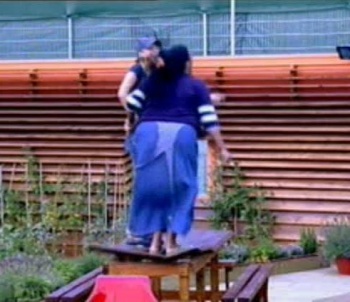 Alison and Kate break the garden table.
Alison and Kate break the garden table.
"Betting end!" -- Banzai
Casting the show from its audience encourages viewers to think they own the characters. From time to time, this can go too far. Viewers, encouraged by the transparent fourth wall and jibbering away on Speak Your Branes forums, began to pester the production staff with questions and demands. They said that this is an outrage, that is a travesty, the other was done far better last year.
The producers are there to make good television. They might actually know what they're doing, what's coming up, the greater plan for the series. It's great when the show tells us something about the human condition, it's fabulous when stars come to public attention, but the bottom line is that the show has to be fair, and has to be entertaining. We stopped watching for the years when Big Brother forgot to be entertaining, and re-started when we found it tickled our funnybone and said something to our heart. From reports, we should have tuned in last year as well.
Viewers know what they like: the same thing they liked last week, last month, last year. The producers always wanted to push the envelope, do something different. "The vote-to-evict semi-final was unfair, they've never done that before" squealed contributors last month. But they were wrong: exactly this had happened back in series 5. "Announcing the evicted housemates in production order has caused me to lose bets", whined others. More folly you, gambling is foolish at the best of times, and it damages Big Brother for everyone. We still blame a betting coup for eliminating Alison Hammond far too early, and reckon that another could have taken down Sunshine Martin. BB3 without Alex, BB11 without Caoimhe? Very different prospects.
True fact. The paper writing the most about Big Brother in its opening weeks was the Daily Mail, recounting every twist and turn with relish, and adding its own special seasoning of snobbish superiority. Garnish with hypocrisy and serve.
"Where I think Big Brother has done its job again is that it has caused us to think a bit more about a subject that we might not consider very often. The programme has managed to do that off and on since it started and it's one of my favourite elements of the show." – Cameron Stout, writing in 2010.
In a good year, Big Brother has deliberately tried to demistify the Other in society. Big Brother's treatment of people with disabilities has been exemplary. Mikey, the contestant who happened to be blind. Pete, the contestant who happened to have Tourette's. Steve, the contestant who happened to have had his legs blown off in a bomb blast. Craig, the contestant who happened to have dyslexia. These people were shown as they are – vibrant, engaging, prone to sitting around on the sofa, lovestruck fools, throwing themselves into tasks like a good 'un, or not. They weren't always perfect, they weren't always shining examples to humanity. They were people. Contestants who were people first, contestants second, and just happened to have disabilities.
The tabloids wanted a transsexual, and Nadia Almada delivered for them in 2004. Delivered for them, and for us. Again, Nadia was normalised, presenting a different view to a cisgendered society. Even Davina and Dermot's constant references to "Nadia's big secret" couldn't undo all the good work, as though the fact that she was born with male genitalia was the only remark-worthy thing about her. She showered in high heels, for goodness sake!
"Nikki! Under the duvet! Quick!!" – Brian Dowling, 2010
Some have argued that heteronormative forms of intimacy are strengthened by the norms of romantic love, even when the participants are not heterosexuals. The standard reading: guy chases after gal and wins her heart. That begat gal chasing after guy, then guy chasing after guy, gal chasing after gal, all the while aiming for a One True Pairing that will last indefinitely, or at least until the end of the series. Others argue that this really is a load of bunkum, and just as different-sex romances never run smoothly, so same-sex couples will encounter difficulties.
2010 saw chases and romantic ideals from all directions. Josie was infatuated with John James, but he didn't return the affection, and there was much moping until he was worn down, went under the famous duvet, and stayed there for about six weeks. Shabby took an instant shine to Caoimhe, but she didn't return the affection, and there was some of the most bittersweet and heartfelt television ever. Mario found himself gravitating to Ben, who politely made it clear that he would not reciprocate, and the two found a level of close friendship, just as Mario later would with Andrew. Four different couples, five very different responses, all there for the viewer to compare and contrast.
This year had just the latest in a long line of gays (and a handful of lesbians) on Big Brother. The series didn't set out to subvert the ostracisation of homosexuals by presenting them as "normal", indistinguishable from heterosexual counterparts. No, they were presented as people first, labels later. Within a few days, viewers knew Anna Nolan for her guitar skills, Brian Dowling for being entertaining, Josh Rafter for ... er, not keeping his campaign promises. There were less positive role models – Kitten Pinder was a rebel without a clue, Marco Sabba squealed like a seal, but Dan Bryan was calm and witty and reached the final three. And so it went on. Big Brother's shown Craig's unrequited pursuit of Anthony with the same frankness as Helen and Paul, and treated Charlie and Rodrigo just as it treated Michelle and Stuart. Consistently, the portrayal has been unflinching: these are people first, contestants second, their sexuality is far down the list.
On scripted dramas, these relationships would have been progressed through staged scenes and clichéd revelations, at times opportune to the series producer. Though Big Brother follows many of the conventions of soap opera, the raw material doesn't follow the narrative conventions of soaps. People don't confess their desires at the end of an episode, but when the mood and the opportunity presents itself. That's real life.
"Guess what? I got booed as well." – opening night, 2010.
Big Brother has spawned a zillion unofficial websites, all trying to give the latest and greatest news ahead of the official site. Most of them encourage knee-jerk reaction, and provide a place for plotters to dream up more and more complex schemes. "Let's get out the deadwood: vote Steve, Dave, Andrew, and JJ" was the cry late in the last series. After everyone had had their say, three remained. "It's a fix!" said the plotters. No, it's democracy. The people have spoken. The "speak your branes" websites represent themselves, and no-one else.
"I need a place to hide my Diva magazine from my Dad"
By showing the viewers people who are just like them, Big Brother is occasionally able to bring about changes in its audience. The programme shows realistic role models, realistic because they are imperfect, they have flaws. By observing these people on television, viewers will be able to make the short hop and reflect upon themselves and upon people they know. This can give a glimpse of a common experience, the things that bind humanity together.
The greatest example is Cameron's trip to Africa in BB4, swapping places with Gaetano. UK viewers were able to see a real African gentleman in their house, and follow a real Orcadian gentleman on his travels. For a little while, the artificial barriers of nationality came down, and we were all citizens of one planet, watching entwined versions of the same show.
On a smaller scale, viewers found a favourable climate to talk about their eating disorders after seeing Nikki, or feel more comfortable with their sexuality, or compare notes on casual racism and inadvertant insults. When it tried, Big Brother could be ever-so-subtle public service broadcasting.
"They'll be making the stories they want out of the footage they've got. There'll be love stories, there'll be hate stories." – Shabby
When a television programme is confident, it tells bold stories about the world it inhabits. The stories can be charming, they can be nasty, they all make sense of the world. They are always stories: they are a mediated version of events. Big Brother employed many cameramen each day, filming three or four events at any one time. Any viewer who tried to follow all of these raw feeds would have to be watching something like 70 hours of television, every single day for three months.
One criticism levelled against the producers is that they deliberately slanted the highlights shows to favour contestant X. Or work against contestant Y. Or do both for contestant Z at the same time. Usually, these claims were from people who particularly supported, or particularly disliked, the contestant in question. Some of the bias was in the eye of the beholder, of that we're sure – viewers will edit the shows in their minds just as much as the professionals will edit the footage.
The producers can't make someone say something they haven't, but they can pick and choose which words to distribute further. Almost every contestant complains about the editing, that the producers preferred to show a lot of something that the contestant believes is of marginal importance. It helps the producers to define each person in a few adjectives: Victor Ebuwa was confrontational, violent, gangster, and that was the caricature the rest of the Ultimates knew.
The production staff claimed that they never had favourites, that they never edited the programme in favour of one person, or against one person. We have no reason to doubt that there was never a masterplan, that the editors went into the job expecting to produce an unbiased programme, but we suspect that it wasn't always the result. In any environment, subconscious biases are going to creep in, ones that are lurking below the surface of the mind and subtly influence the results. This happens, it's human nature.
All that we ever asked was that the producers accepted that they were human, that they were going to produce flawed programmes that reflected the truth as they saw it, and that wasn't necessarily going to be the truth as other people saw it. If predisposed to see someone as lovable, people will look for confirmation that their bias is correct. If there's a thought that someone else is a troublemaker, the editors have to guard against selecting footage to bear out that impression. Where the subconscious influences on the editors didn't balance out, someone on the interwebs would surely squeal, and the squealiest voices attracted the most grease.
As if to prove how unflappably professional Davina is, take a look at her interview with Vanessa Feltz last Wednesday. The eviction interview was progressing when a Johnny Useless jumped over the security fence behind Miss Feltz. Davina couldn't ignore the disturbance, we'd seen it on the side of the screen, but she carried on with the interview, and Vanessa gave sensible answers – there may be security guards kicking off behind her, but the show must and did go on. It's live television, people, and anything can happen – even people booing when Brian Dowling's name is mentioned.
"I'm the alpha male, I rule this house." – Coolio, 2010
What was the formula for a winner? Being eye-candy will get a contestant so far, but being kind and generous will take them much further. Offending the women of the house – being sexist, being inconsiderate – will scupper anyone, as it's young women who will vote in huge numbers for the winner. Not holding grudges helps, and reaching out to help someone else no matter how much it hurts is a major positive. Too much testosterone is the surefire way to secure an early exit. Josie Gibson won this year because she represented the average voter: a bit insecure, a bit anxious, but completely genuine and with an awful lot of love in her heart.
This column was wrong to say in late 2006 that Big Brother had nothing left to teach us. The tenor of the show – too many attention-seeking, argumentative, spoiled brats doing things that just weren't funny – did nothing to help its cause. But there was always the chance that Big Brother would provide moments of transcendence, when we just wanted to jump into the telly and interact with the contestants ourselves. Share in the highs, give comfort in the lows, laugh and jump and cry and shout and smile.
Big Brother's shown up that some people will rush to judge and condem and hate and fear people who are not like them. It's shown that first impressions can be wrong, and encouraged viewers to question their own reactions. That there's a certain thrill in watching innocents being thrown to the lions, and a greater one when the lions lose. That the television directing can be astoundingly ace, even on live shows. And that the soap operas don't deserve to dominate schedules.
And we would learn about the human condition in the longest and greatest social experiment yet played: a whole generation that grew up with Big Brother as part of their social fabric, a touchstone that everyone of a certain age knew. By 2010, most contestants had spent their formative years in Big Brother's culture. Goodness, one had spent more than half his life in the Big Brother era. These people had grown up with the programme, they knew the outline, and couldn't help but discuss previous experiences. We're glad that the producers let that rule slip a little, for denying Big Brother's cultural presence is like denying all references to The Beatles.
The too-cool-for-school television critics turned off around 2005, and never bothered to come back. They missed treats. They lose. We win.
It's a pleasure to give thanks to lots of collaborators, conspirators, and inspirations for this edition. Thanks to all the contestants who have written about their experiences, particularly Dean, Narinder, and Cameron; to Jean Ritchie, whose prose has tapped into millions of memories; and to Adam Curtis, for providing a motif. To our friends Anna, Caz, Chris, Craig, Dave, David, Izzy, Jae, Kitty, Nick, Pete, Sarah, Simon, and everyone else who has shared their thoughts in this and previous summers. Special thanks to Ben, Shabby, and The Tree, for proving that we should keep watching because we really did care about this year's contest and everyone in it.
And we must thank the crew – visible faces like Davina and Dermot; top producers Conrad Green, Paul Osbourne, Ruth Wrigley, Sharon Powers, and Phil Edgar-Jones; task producers Edd West, Daniel Nettleton, Ben Riley. And also thanks to all the behind the scenes staff – the loggers, camera people, editors, house designers, welfare producers, water-cleaners. We'd all have noticed if they did a poor job, and we hardly ever noticed them doing a poor job. We might have hated some of the plotlines they ran, but that proved only that we cared. Big Brother was always a consummately professional show. Well done, everyone.
In the end, and to the surprise of approximately no-one, Brian Dowling was confirmed as the best Big Brother housemate ever.
To have Weaver's Week emailed to you on publication day, receive our exclusive TV roundup of the game shows in the week ahead, and chat to other ukgameshows.com readers, sign up to our Yahoo! Group.



